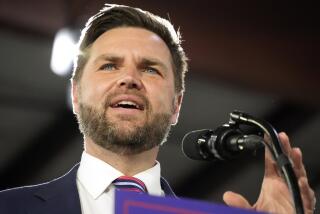Dean Wrestles With the Question of Faith
- Share via
STORM LAKE, Iowa — Democratic presidential candidate Howard Dean, who rarely mentions religion and God on the campaign trail, said he was wrestling with how to talk about faith in parts of the country where it figured prominently in daily life.
During a conversation with reporters on his campaign plane late Friday night, Dean said recent stops in South Carolina had moved him to try to be more forthcoming about his view of religion to connect with voters who speak openly of their relationship with God.
“I think that I’m gradually getting more comfortable to talk about religion in ways that I did not talk about it before,” he said. “It doesn’t make me more religious or less religious than I was before, but it does mean I’m willing to talk about it in different ways.”
Many of his opponents in the Democratic race have sought to highlight their faith, seeking to bridge a divide among U.S. voters when it comes to religious practice and political affiliation.
Dean attended an Episcopal boarding school as a teenager and now views himself as a Congregationalist -- a move that he says happened after he had a skirmish with the Episcopal Church in Vermont over the construction of a bike path on church land in the 1980s. But he does not attend church regularly.
Dean’s wife is Jewish and their two children have been raised in that religion. Dean says he knows many of the Hebrew prayers and the family celebrates both Jewish and Christian holidays at home.
As he stumps for the presidency, Dean usually has only discussed faith and God when asked about it by voters, and even then he has been reticent. But he has bristled at suggestions that he is perceived as more secular than his Democratic rivals and President Bush.
“I pray every day,” he told reporters in mid-December. “I don’t wear it on my sleeve, because I’m a New Englander, and New Englanders don’t wear much on their sleeve that’s personal.”
At the time, Dean said he did not feel comfortable expanding on his religious beliefs. “The reason I don’t bring up religion is partly because I’m a reasonably private person, and partly because I think people’s religion is their own business,” he said.
But on Friday, Dean indicated that he was trying to adjust to the idea of being more frank about his religious views, especially after seeing how people in South Carolina easily refer to God in public conversation.
“The people there are pretty openly religious, and it plays an ingrained role in people’s daily lives,” he said. “I think that I didn’t understand fully how comfortably religion fits in with daily life in the South, in both black and white populations.”
Dean said he had thought a lot about his faith in recent years, especially after a trip to Israel in December 2002. In one part of the Old City of Jerusalem, Dean said he was moved to see modern apartments overlooking the remains of ancient dwellings, places where, his guide noted, “3,000 years ago, people prayed the same prayers, in the same language.”
In Galilee, he stood on the mountain where Jesus preached.
“If you know much about the Bible -- which I do -- to see and be in the place where Christ was and understand the intimate history of what was going on 2,000 years ago is an exceptional experience,” Dean said.
That trip -- along with learning about Judaism from his wife -- has given him a greater appreciation of the roots of Christianity, he said.
When asked about his favorite book in the New Testament, Dean first cited the Book of Job, which is in the Old Testament and is the story of a pious man whose possessions are stolen and children killed before God ultimately restores his good fortune.
Dean corrected himself about an hour after the interview ended, returning to the front of the plane to tell reporters he misspoke when he said the book was in the New Testament.
He said that despite its dark tone, the story resonates with him. “It’s such an allegory,” he said. “It sort of explains that bad things could happen to very good people for no good reason.”
When pressed for his favorite book in the New Testament, he cited the Gospels.
More to Read
Get the L.A. Times Politics newsletter
Deeply reported insights into legislation, politics and policy from Sacramento, Washington and beyond. In your inbox three times per week.
You may occasionally receive promotional content from the Los Angeles Times.










